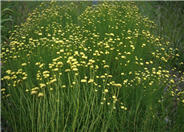
Common name:Yellow Lavender Cotton
Botanical name:Santolina pinnata
Yellow Cotton is a low shrub to about 2' and a little bit wider. It has dense rich green foliage and yellow flowers. It creates a distinct Mediterranean look.
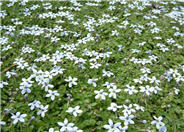
Common name:Blue Star Creeper, Isotoma
Botanical name:Pratia pedunculata
Laurentia fluviatilis has bright green, nearly stemless, 1/4" leaves. In late spring and summer, these form a backdrop for equally tiny, star-shaped pale blue flowers.
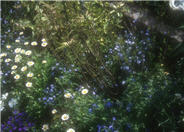
Common name:Miniature Marguerite
Botanical name:Chrysanthemum paludosum
Chrysanthemum paludosum is an annual in Alaska. In the summer bears white flowers resembling minature Shasta daisies on 8-10 in. stems.
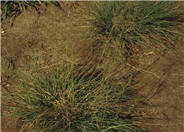
Common name:Alkali Sacaton or Dropseed
Botanical name:Sporobolus airoides
This winter-dormant drought tolerant grass tolerates a variety of soils including alkaline conditions. Pinkish inflorescence in summer. Best in mass plantings.
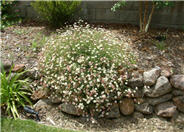
Common name:Santa Barbara Daisy, Mexican Daisy
Botanical name:Erigeron karvinskianus
This low mounding perennial, with fine leaves and white to pinkish daisy-like flowers, is an excellent asset to rock gardens. Capable of spreading.
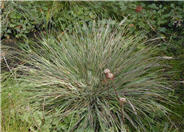
Common name:Reed Grass
Botanical name:Calamagrostis foliosa
This tufted perennial bunchgrass is native to the northern California coastal scrub. It forms a beautiful, dense mound of grey greeen leaves that reach 2' tall, with showy arching flower stalks to 3' tall. Reed Grass leaves assume an attractive purple coloration in the fall and winter. This evergreen should be grown under sun, with little or no summer watering required. -Monterey Bay Nursery

Common name:Boston Ivy
Botanical name:Parthenocissus tricuspidata
This deciduous vine grows leaves that are usually lobed and divided into 3 leaflets. It clings tightly to any surface.
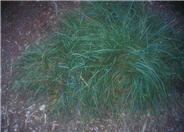
Common name:Blue Moor Grass
Botanical name:Sesleria caerulea
This grass will grow to about 18-24"H x 18-24"W. It has blue/green or gray/green leaves.
| Designer: | Walkway to Gate |
Photographer: GardenSoft |
Soils and Compost:
Maintain a two to four inch layer of mulch on the soil surface to reduce weeds, infiltrate rain water, and reduce compaction.
Water Saving Tip:
Eliminate runoff, especially with fixed spray sprinklers, clay soils, and slopes, by dividing the total watering time into shorter increments.
This allows water to soak in.
Integrated Pest Management:
Remove irrigation water and fertilizer from areas where you don't want weeds to grow.

